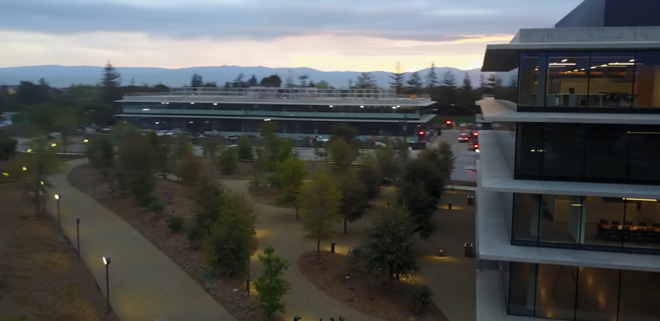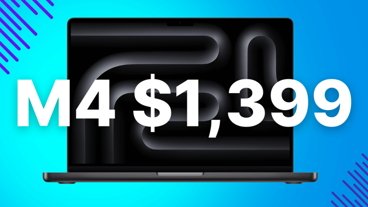Apple increased its research and development budget to nearly $2.8 billion during the second fiscal quarter of 2017, meaning the company spent a almost $5.7 billion on the line item over the past six months.
According to a Securities and Exchange Commission filing published on Tuesday, Apple spent a total of $2.78 billion on R&D for the second fiscal quarter of 2017, equal to just over 5 percent of quarterly net sales. The figure represents an increase of $266 million from the same period a year ago.
While an official explanation for the increased outlay was not mentioned, Apple has in the past connected R&D growth to new hires and related expenses. Like other successful tech industry firms, Apple consistently grows its R&D commitment with each passing quarter as its various product segments expand.
Increased R&D expenditures are often solely attributed to work on future products, which is true to a certain extent, but much of the year-over-year growth can be chalked up to maintenance of existing lines.
For the three-month period ending in March, Apple posted iPhone sales of 50.8 million units, a contraction from the year ago quarter. Mac sales were up slightly, while iPad sales declined to 8.9 million units.
During an investor conference call, CEO Tim Cook noted Apple's wearables business is booming, with combined AirPods, Apple Watch and Beats sales generating $5 billion in over the past four quarters. Together, the company's wearable category was the size of a Fortune 500 company, Cook said.
Apple is of course dedicating some portion of its R&D spend to future products and initiatives. The company's "Project Titan" self-driving car program, augmented reality solutions and health-related products are thought to be three major areas of interest.
Apple reportedly refocused "Project Titan" from work on a full-fledged self-driving vehicle to the development of supporting hardware and software technology. Under new project lead Bob Mansfield, "Titan" has just recently progressed to road testing.
After a copy of Apple's self-driving car permit application was revealed in April, one of the company's three Lexus RX450h testbeds was spotted driving in Silicon Valley last week.
As for AR, Cook has repeatedly praised the budding technology as an area of great interest for Apple. In an interview earlier this year, the CEO likened AR to the smartphone, saying it "could improve a lot of lives" while being entertaining.
On the health front, a report last month claimed Apple has been working on a breakthrough noninvasive glucose sensor for tracking blood sugar levels in patients with diabetes. The technology, heralded by some as a "holy grail" of medicine, could make its way into a future Apple device, perhaps a wearable like Apple Watch.
Apple is also working on more mainstream products, including a next-generation Mac Pro and accompanying "pro" display that are expected to launch in 2018.
Other more secretive projects include a supposed competitor to Amazon's Echo speaker. Not much is known about the purported device, but a prominent leaker recently said they expect hardware to feature both Siri and Beats technology. Analyst Ming-Chi Kuo chimed in this week, saying Apple's first artificial intelligence appliance for the home will boast a custom ARM processor, high-end audio components and a premium price. Kuo believes there is more than 50 percent chance that Apple will unveil the product at WWDC in June.
Beyond R&D, Apple reported total operating expenses of $6.5 billion, or 12 percent of net sales, up 9 percent year over year.
 Mikey Campbell
Mikey Campbell







-m.jpg)






 Christine McKee
Christine McKee
 Malcolm Owen
Malcolm Owen

 Sponsored Content
Sponsored Content

 Amber Neely
Amber Neely











11 Comments
and people still mock the Beats acquisition...lol
I'll be anxious to see what all that R&D spending is going to do for the coming MacPro or MacMini. I sure hope it will be more than just some new case design. I honestly don't see how hard it could be for Apple to meet or beat industry standards on those new products. That stuff can't be rocket science when there are so many readily available components on the market allowing consumers to hand-build their own powerful computers. Apple's "cheesegrater" MacPro only needed to be updated with the latest components and Apple recently ruined the MacMini by making it completely non-upgradeable. Honestly, what type of people are running Apple to make such blunders
Apart from computers, I'd sure like to see Apple deliver an AppleWatch than can measure blood sugar. That would be so awesome for diabetics.
I'll never figure out all the whining over the Beats acquisition. A measly $3B. Microsoft spent $12B on Nokia and got nothing in return. Now they've bought LinkedIn for $26B and they're not making money from it. How come no Microsoft investors are whining? They all seem quite happy as Microsoft's share price continues to rise. Apple investors are freaking greedy crybabies. It's no wonder Apple can't grow revenue when investors are weeping over such small acquisitions.
A new MacPro is "needed", a new MacMini is not.
Apple analysts do not equal Apple shareholders.
Keeping Macs updated is something Apple should do as it is a great product line which increases productivity for ~100M users, and it is a stable and profitable business. However, traditional PCs (including Mac) are not the future of "personal computing technology" - Apple is rightly focusing on bigger things.
$1.1M per hour.
Building all this new stuff is expensive. Especially an own-branded optionally self-driving daily driver.
I find it amazing that people have not made the correlation between augmented reality and self-driving cars. They both utilize the same core technology - being able to recognize the space you're in and/or what you're looking at and then react in some manner. For a car it's a mechanical reaction. For AR, it's layering digital data over the "scene". They are both based on real-time image recognition, 3D mapping, and position/direction detection.
This is why Tim Cook is correct in stating that AR is much more significant than VR. There's much broader use case into many disparate products and markets. Being able to "see" and react to the real world is many times more complex than creating a finite virtual world to move around in.
Furthermore, I highly doubt the cars Apple is using are actual self-driving cars, I'm guessing they are a teaching tool, to allow the system to watch and learn how to drive - how the driver reacts to specific situations. That's why Apple requires special certification for each driver - they need to be accurate and deliberate in their actions.